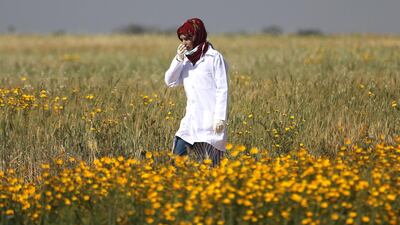Israel’s killing of a young, unarmed volunteer medic at a Gaza border protest is setting off a chain reaction of death and violence in the beleaguered enclave.
Razan Al Najjar, 21, was approaching a wounded protester near the border fence in Khan Younis when she was shot dead on Friday.
Her death just a few hundred metres from her home has shaken Gaza's 1.8 million inhabitants, who have hailed her as a symbol of Palestinian heroism.
Amid the recent spate of targeted killings and deliberate maiming of Palestinians by Israeli snipers that has left more than 120 dead and wounded hundreds more, her death stands out for its stark injustice. Her death was filmed as she walked towards her patient with her hands raised, dressed in a white medical vest and wearing her health worker ID.
Israel says her killing was unintentional and has opened an investigation. But, as protests scheduled for this Friday approach, Gaza’s rage is boiling over. Already Razan’s death is begetting more death, as incensed Palestinians attempt suicidal acts of vengeance.
_______________
Read more:
Israel and Gaza exchange fire after Palestinian woman killed at border
Israel to cut Palestinian funds over arson damage
US vetoes Kuwait UN proposal to protect Palestinians
_______________
On Monday morning, Israeli forces killed Ramzi Al Najjar, Razan’s 30-year-old cousin, after he hacked his way through the fence that separates the besieged territory from Israel.
"Ramzi was shocked by Razan's murder,” his 24-year-old sister Reem Al Najjar told The National. “He just kept repeating that he would avenge her death, he was just so sad and frustrated.”
In this tiny and cramped strip of land, events can reverberate and their repercussions amplify. Reem was speaking at her home, just five metres from the third floor apartment of Razan’s family. In a field of wild flowers fifty metres to the east is the border area where Reem and Razan were killed. Fifty metres to the west is the crowded cemetery where Razan was laid to rest among the other "martyrs" killed by Israel.
Thousands of mourners packed the narrow streets of Khan Younis to mourn her funeral procession on Saturday and today her face smiles down from the posters that adorn lampposts lining the streets. Already, grief has hardened into anger.
At one time, Ramzi had dreams. They were modest, yet impossible: finish his studies, find work and get married. But after high school there was no money for university, and with no jobs available, no way to save for marriage. Instead, Ramzi became a regular at protests. It was an escape from the tiny two bedroom apartment he shared with 16 family members.
Razan attended the same demonstrations as Ramzi in her role as a medic. Through those rallies, the cousins formed a close bond. She often treated him for tear gas inhalation. Her death was ultimately too much for Ramzi to bear, his family said.
On Monday morning he left the apartment and walked to the border fence with a few friends. According to the Israel Defense Forces (IDF), one of them was carrying an axe.
Shortly afterwards a man with a covered face came to their home, Ramzi’s 28-year-old brother Ramiz said. “His voice was breaking and he told us that Ramzi had been shot and taken by the Israelis.”
In the IDF’s account, two “terrorists” attempted to infiltrate Israeli territory, one allegedly with an axe. “In response, IDF troops arrived at the scene and fired towards the terrorists, killing one of them.”
One of the men who was with Ramzi disputed the IDF’s version of events. “We only had wire cutters to cut the fence,” Abu Rozana told The National.
“We cut a small hole in the fence and walked perhaps three metres beyond,” said the 27-year-old, who asked to use a pseudonym to protect his identity. “The Israeli soldiers started to shoot towards us and we pulled back, but Ramzi was shot in his leg and got some shrapnel in his head.”
Ramzi’s family contacted the Red Cross, who confirmed Ramzi’s death. “His body is still with the Israeli army,” said his brother Ramiz. “We are contacting a number of human right associations to help us to bring his body so we can bury him.”
Later on Monday, Abu Rozana said he received a call from someone who identified himself as an Israeli intelligence agent. “He told me to stay away from the fence or he would kill me like Ramzi.”
But for increasing numbers of Gaza’s despondent youth, protesting in the face of death remains the preferred choice over a shackled life in the enclave that has suffered more than a decade of Israel’s crippling siege.
“We breached the fence to send a message to Israel,” said Abu Rozana.
“This is our land. We will avenge Razan’s murder. We will not stop.”

